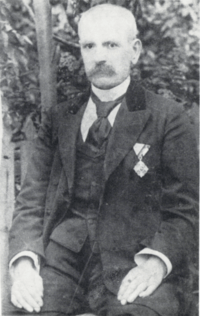Kuzman Shapkarev facts for kids
Quick facts for kids
Kuzman Shapkarev
|
|
|---|---|

Kuzman Shapkarev decorated with the Bulgarian Order "For Civil Merit", 5th Class
|
|
| Native name |
Кузман Анастасов Шапкарев
|
| Born | February 1, 1834 Ohrid, Manastir Vilayet Ottoman Empire |
| Died | March 18, 1909 (aged 75) Sofia, Bulgaria |
| Occupation | Writer, publicist, teacher, folklorist |
| Language | Bulgarian |
| Period | Bulgarian National Revival |
| Spouse | Elisaveta Miladinova-Shapkareva (d. 1870), Ekaterina Shapkareva |
| Children | Kliment Shapkarev, Ivan Shapkarev |
Kuzman Anastasov Shapkarev (Bulgarian: Кузман Анастасов Шапкарев) was an important Bulgarian writer, teacher, and scientist. He was born on January 1, 1834, in Ohrid, which was part of the Ottoman Empire at the time. He passed away on March 18, 1909, in Sofia, Bulgaria.
Shapkarev is known for collecting folk stories and traditions. He also wrote many textbooks. He played a big role in the Bulgarian National Revival, a time when Bulgarians worked to bring back their culture and language.
Contents
Life and Work
Early Life and Teaching
Kuzman Shapkarev was born in Ohrid in 1834. He became a teacher in various Bulgarian schools. He taught in towns like Ohrid, Bitola, Prilep, Kukush, and Thessaloniki from 1854 to 1883.
He worked hard to make sure the Bulgarian language was used in these schools. He even helped start two Bulgarian high schools in Thessaloniki between 1882 and 1883.
Writing Textbooks
Shapkarev wrote many textbooks to help students learn. Some of his books include "A Bulgarian Primer" (1866) and "A Big Bulgarian Reader" (1868). He also wrote "Mother Tongue" (1874), "Short Land Description (Geography)" (1868), and "Short Religion Book" (1868).
He wanted his books to be easy for everyone to understand. He felt that the language used in some books was too difficult for people in his region. So, he tried to write in a way that was clear to his fellow Macedonian Bulgarians.
Contributions to Culture
Kuzman Shapkarev wrote for many Bulgarian newspapers and magazines. He shared his ideas and knowledge with a wider audience.
He also worked with important figures of his time. He helped the revolutionary Georgi Rakovski. He also assisted the Miladinov Brothers in their work of collecting folk traditions.
Later Years
After 1883, Shapkarev moved to different parts of Bulgaria. He lived in cities like Plovdiv, Sliven, and Stara Zagora. Besides his scientific and public work, he also worked as a notary and a judge.
In 1900, he became a regular member of the Bulgarian Academy of Sciences. This was a great honor for his contributions to science and culture.
He wrote an autobiography called "Materials for the Revival of Bulgarian National Spirit in Macedonia." This book tells the story of his life and his efforts to promote Bulgarian culture.
His Family
Kuzman Shapkarev's family also played important roles. His first son, Kliment Shapkarev, was a leading activist in the Internal Macedonian Revolutionary Organization. His second son, Ivan Shapkarev, became a high-ranking officer in the Bulgarian Army. His grandson, Petar Shapkarev, was a well-known Bulgarian economist.
Important Works
Scientific Books
- Rusalii. The old and too interesting Bulgarian custom preserved in Southern Macedonia, 1884
- Collection of Folk Monuments (Bulgarian folk tales and beliefs), 1885
- Collection of Bulgarian Folklore, volumes I-III, 1891–1894
- Materials for the Biography of the Miladinov Brothers - Dimitar and Konstantin, 1884
Textbooks for Students
- A Bulgarian Primer, 1868
- A Big Bulgarian Reader, 1868
- Short Land Description for Children, 1868
- Mother Tongue, 1874
- The Bulgarian Folklore Collection:
- Books I, III, IV, V, VI - Songs
- Book VII: Bulgarian Customs, Rituals, Beliefs and Costumes, 1891
- Books VIII and IX: Bulgarian Folktales and Beliefs (with some Macedo-Romanian and Albanian tales), 1892, 1894
Honours
Shapkarev Buttress on Fallières Coast, Antarctica is named after Kuzman Shapkarev. This shows how important his work was.
Images for kids
 | Percy Lavon Julian |
 | Katherine Johnson |
 | George Washington Carver |
 | Annie Easley |


